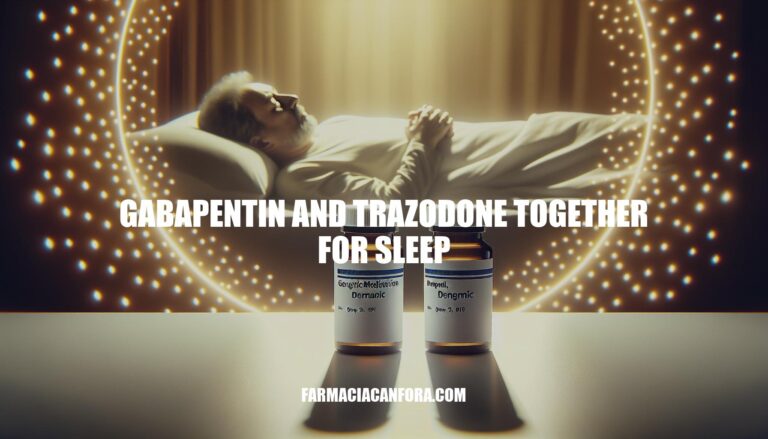


Combining gabapentin and trazodone for sleep has garnered increasing attention due to their potential synergistic effects. Both medications are known for their sedative properties, making them promising candidates for treating sleep disorders. This combination is being explored to enhance sleep quality and address insomnia more effectively.
Here’s how gabapentin and trazodone work together to improve sleep:
By addressing both the physical and psychological aspects that can disrupt sleep, this combination can be particularly effective for improving sleep quality.
Combining gabapentin and trazodone for sleep improvement has shown promising results in several studies. Gabapentin, primarily used for neuropathic pain and seizures, and trazodone, an antidepressant with sedative properties, target different neurotransmitter systems, potentially offering a more comprehensive approach to treating sleep disorders.
A study published in 2024 demonstrated that low doses of trazodone added to a full gabapentin dose improved both pain and sleep outcomes in patients with painful diabetic neuropathy (PDN) while being well tolerated. Another review highlighted that this combination could provide more comprehensive sleep improvement for individuals with complex sleep disorders or those who have not responded adequately to single-drug therapy.
These findings suggest that the combined use of gabapentin and trazodone can be effective for improving sleep, particularly in patients with complex or treatment-resistant sleep disorders. However, it’s essential to consult with a healthcare provider to tailor the treatment to individual needs and monitor for potential side effects.
Combining gabapentin and trazodone for sleep can increase the risk of several side effects and requires careful medical supervision:
Always consult with a healthcare provider before starting or combining these medications to ensure safe and effective use.
Here are some anecdotal experiences from patients using gabapentin and trazodone together for sleep:
Positive Outcome: One patient shared that combining gabapentin and trazodone significantly improved their sleep quality. They mentioned that gabapentin helped reduce their anxiety and nerve pain, while trazodone helped them fall asleep faster and stay asleep longer. They felt more rested and less anxious during the day.
Challenge: Another patient reported experiencing excessive drowsiness and difficulty waking up in the morning when taking both medications. They found it challenging to concentrate and felt groggy throughout the day, which affected their daily activities and work performance.
Positive Outcome: A patient with chronic pain and insomnia noted that the combination of gabapentin and trazodone provided relief from pain and improved their sleep. They appreciated that they could sleep through the night without waking up due to pain, which was a significant improvement in their quality of life.
Challenge: Some patients mentioned experiencing dizziness and confusion when taking both medications together. This was particularly problematic for older adults, who found it difficult to maintain their balance and perform daily tasks safely.
Positive Outcome: A patient with fibromyalgia shared that the combination of gabapentin and trazodone helped manage their symptoms effectively. They experienced fewer pain flare-ups and better sleep, which contributed to an overall improvement in their mood and energy levels.
Challenge: Another patient highlighted the issue of impaired cognitive function, particularly in the morning. They felt that their thinking and judgment were affected, making it hard to start their day and perform tasks that required mental clarity.
These experiences highlight both the potential benefits and challenges of using gabapentin and trazodone together for sleep. It’s important for patients to work closely with their healthcare providers to find the right balance and monitor any side effects.
Combining gabapentin and trazodone can be effective in improving sleep quality by targeting different pathways that affect sleep. Gabapentin’s calming effect on the nervous system helps reduce anxiety and pain, while trazodone enhances serotonin levels and promotes relaxation.
However, this combination may increase the risk of side effects such as excessive sedation, dizziness, confusion, respiratory issues, and serotonin syndrome. It is essential to consult with a healthcare provider to determine the appropriate dosages and monitor for potential interactions and side effects.
Patients should be aware of the potential benefits and challenges of using these medications together, including improved sleep quality, reduced pain, and increased risk of cognitive impairment and impaired coordination.